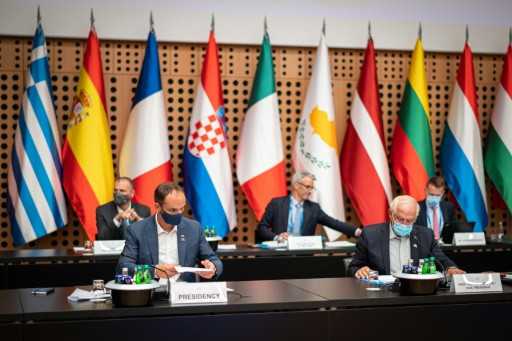EU sets conditions for Taliban ties and Kabul presence
04 September, 2021

EU countries on Friday laid out conditions for stepping up engagement with the Taliban, agreeing to establish a joint Kabul civilian presence to help departures if security allows.
"We have to engage with the new government in Afghanistan, which doesn't mean recognition, it's an operational engagement," EU foreign policy chief Josep Borrell said after a meeting of the bloc's foreign ministers in Slovenia.
"This operational engagement will increase depending on the behavior of this government," he said.
Borrell laid out a raft of "benchmarks" that the new authorities would have to meet as the Taliban gears up to announce a new government after seizing power.
These include Afghanistan not serving as a base for terrorism, respecting the rights of women and the media, the establishment of an "inclusive and representative" government, and allowing access for aid.
And he said the Taliban must live up to its commitment to allow at-risk foreign nationals and Afghans to continue to leave.
He added that the EU still hopes to evacuate "hundreds, or thousands" of at-risk people.
"We know who they are. They have been working with us, or they have been working to build a democratic and free Afghanistan. We are strongly committed to take them out," Borrell said.
"We are not going to reopen a (diplomatic) delegation with a head of delegation as if nothing had happened," he said, but added that a less formal mission could be sent to coordinate evacuations.
German Foreign Minister Heiko Maas stressed the conditions set out "are not negotiable for us".
But, he told journalists: "Of course nobody has the illusion that all of this will be fulfilled 100 percent in the coming few days," calling it a "long-term task".
Borrell said the EU ministers agreed to work jointly, and to "coordinate our contacts with the Taliban, including through a joint European Union presence in Kabul... if the security conditions are met".
He said that, if security in Kabul was not assured, an EU mission could be set up in the Qatari capital Doha, where the Taliban have an office for contacts with the outside world.
EU diplomats formerly based in Kabul have left Afghanistan for neighboring countries or returned to Europe.
The bloc fears the absence of its diplomats leaves the field open to countries such as Russia, China, Iran, Pakistan and Qatar, which are keeping their embassies open.
Maas said that "if we want to help the Afghans we need people in the country who can get this aid to the people in need".
"There have been a lot of moderate tones in the last few days. But we don't want to judge the Taliban and this government by their words, but by their deeds," he said.
"In this respect, it will be decided in Afghanistan whether and when we are ready to make the aid that was available, available again."
On humanitarian aid, Borrell said the EU wanted to step up its help for the Afghan people but would judge the authorities "according to the access they provide".
That comes as the United Nations said it had restarted humanitarian flights to parts of the country, linking the Pakistani capital Islamabad with Mazar-i-Sharif in northern Afghanistan and Kandahar in the south.
Source: japantoday.com
